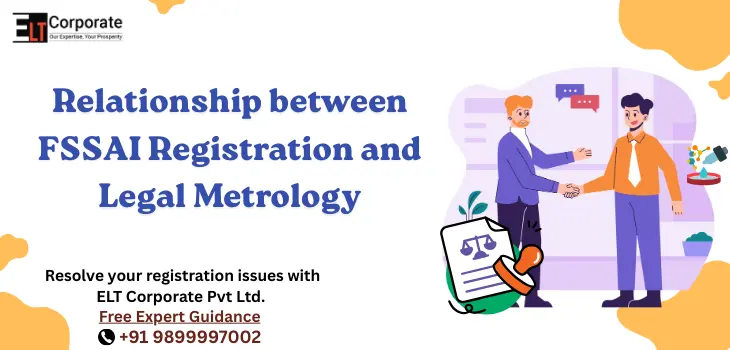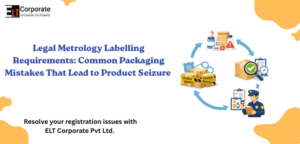In India’s regulated market, compliance is not limited to the same law. For businesses in the food sector, FSSAI registration ensures food security, while legal metrology compliance guarantees accurate packaging and labeling. Together, these framework protects consumers, builds the reliability of the brand, and prevent punishment. It is necessary to understand the relationship between the two for food businesses, importers and startups.
Why This Relationship Matters
- Consumer Safety – FSSAI ensures that food is safe, legal metrology ensures that the packages are true.
- Transparency – Right MRP, protect the exact label buyers with weight and termination.
- Regulatory coverage – FSSAI covers food quality; Legal metrology includes volume, labeling and measurement.
- Business Trust – Dual compliance enhances customer’s trust and avoids the disruption of the supply chain.
Key Areas Where FSSAI & Legal Metrology Overlap
1. LMPC Certificate
Mandatory for importers and packers of food products.
- Ensures weight, volume, and labeling are correct.
2. FSSAI License & Registration
- Required for manufacturing, storage, distribution, import, and sale of food items.
- Confirms food quality, hygiene, and safety standards.
3. Packaging & Labeling Compliance
Every food package must display:
- FSSAI License number & logo.
- Net quantity (weight/volume).
- MRP (inclusive of taxes).
- Manufacturing/expiry date.
- Nutritional information and ingredients (as per FSSAI).
- Customer care details for grievance redressal.
4. E-commerce Regulations
The food sold online (Amazon, Flipkart, Biggskat, etc.) will have to show both FSSAI and legal metros announcements. The sellers are directly responsible for compliance.
Penalties for Non-Compliance
- FSSAI: Cancellation of license, product recall, fines, and imprisonment for unsafe food.
- Legal Metrology: Fines up to ₹1 lakh, seizure of non-compliant goods, and imprisonment for repeated violations.
- Combined effect: Non-compliance in either area can stall imports, disrupt sales, and damage brand reputation.
Common Mistakes Businesses Make
- Importing food without LMPC certificate at customs.
- Selling packaged food without a valid FSSAI license.
- Using incorrect or incomplete labelling (missing MRP, FSSAI number, net quantity).
- Ignoring bilingual label requirements (English + Hindi).
- Outdated packaging after amendments.
How to Stay Compliant
- Obtain FSSAI license before starting food operations.
- Apply for LMPC certificate before importing or selling pre-packaged food.
- Conduct regular label audits for MRP, expiry, and declarations.
- Verify weighing instruments annually through Legal Metrology.
- Stay updated with notifications from FSSAI & Department of Consumer Affairs.
How ELT Corporate Helps Businesses
At ELT Corporate, we provide complete support for food businesses, covering both FSSAI and Legal Metrology requirements:
- FSSAI Registration & License for manufacturers, importers, and e-commerce sellers.
- LMPC Certificate Registration for packaged food imports.
- Label & Packaging Review for FSSAI + LMPC compliance.
- Support during inspections, audits, and dispute handling.
- End-to-end advisory to ensure smooth operations and market readiness.
FAQs
Q1. Can a food importer operate with only an FSSAI license?
No, importers will also have to receive an LMPC certificate for food products packed before customs withdrawal.
Q2. Do small food businesses also need both registrations?
Yes, both FSSAI and LMPC apply irrespective of business size.
Conclusion
The relationship between FSSAI registration and legal metrology compliance is supplemented. While FSSAI ensures quality and safety of food, legal metrology guarantees the accuracy and transparency of packaging. Together, they protect consumer rights and increase brand trust. By complying with both, businesses can avoid punishment, strengthen credibility and achieve permanent growth in India’s food sector.
Need special guidance on FSSAI and legal metrology compliance? Contact ELT Corporate today for full assistance.








